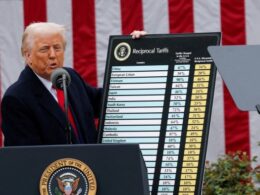Unlock the Editor’s Digest for free
Roula Khalaf, Editor of the FT, selects her favourite stories in this weekly newsletter.
The UK government is exploring ending a scheme used by online retailers to send low-value consignments to Britain free of tariffs, as it readies for a flood of cheap imports following Donald Trump’s trade war with Beijing.
Chancellor Rachel Reeves on Wednesday announced a review of the Low Value Import scheme, which allows £135 worth of goods to be brought into the country without customs duties, after warnings from retailers including Next, Currys and J Sainsbury about the risk from cheap Chinese imports.
“Retailers can see through the actions we have taken today around low value imports that we are absolutely standing up for the British high street against the dumping of cheap imports of products that undercut British retailers,” Reeves said on the sidelines of the annual IMF and World Bank spring meetings in Washington.
A decision to reform the scheme would bring the UK into line with the US and the EU, where fast-fashion and e-retailers such as Shein, Temu and Amazon have helped drive a massive increase in the use of similar “de minimis” programmes.
Both have signalled they plan to end their own import schemes, which allow tariff-free imports of goods up to $800 and €150 respectively.
The US has announced that parcels from China and Hong Kong will no longer be able to use the scheme from May 2, and plans to remove all other countries as soon as practicable. The EU has said it will look to close its scheme by 2028.
Britain’s review of its scheme came as the government set out a package of measures to guard against Chinese goods being diverted to the UK as a result of the 145 per cent tariff wall facing Chinese imports into the US.
These include improved monitoring of trade data to spot import surges and an acceleration of potential defence measures by the Trade Remedies Authority, the body responsible for identifying and deterring unfair trade practices.
Jonathan Reynolds, business and trade secretary, said he had met officials from the TRA to agree “urgent steps” in order to deliver quicker protections for affected companies. “This government won’t stand idly by while cheap imports flood our markets and harm British industries,” he added.
Big retailers welcomed the government review, but groups representing smaller businesses warned that the abolition of low value import schemes globally would make it harder for small and medium-sized enterprises to export products.
Helen Dickinson, chief executive of the British Retail Consortium, which lobbied for the review this month citing the risk posed by high US tariffs on China and some other countries, said it was overdue and would protect retailers and consumers.
“A review of this policy, which was designed to reduce the burden on low volume, low value imports, was already needed. With retailers seeing a rise in the number of potentially non-compliant products entering the UK market, it’s even more critical now,” she said.
But William Bain, head of trade policy at the British Chambers of Commerce, said ministers needed to improve support to help SMEs tackle export paperwork that would result from de minimis schemes ending worldwide.
“Simplifying rules and processes to make trade easier is vital to weathering the current storm,” he said.
The total number of ecommerce parcels sent to the EU doubled between 2023 and 2024 to about 4.6bn, according to a report published this month by the European Policy Centre think-tank. About 1.6bn parcels were sent to the US in 2024, double the number from 18 months earlier, the report added.
Tina McKenzie, policy lead at the Federation of Small Businesses, said that while the UK was right to be alert to the risk of dumping, axing the low value import relief should be a decision made in response to real-time evidence of a flood of imports.
“With 16 per cent of goods moved by small firms sitting below the £135 threshold, a decision to scrap [low value import relief] . . . risks making SME-friendly, low value exporting harder for small businesses across the world and will ultimately lead to higher prices for consumers,” she said.
Source link









